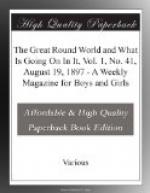In addition to the horrors of the climate, there is no real supply of food obtainable from the Klondike region. There is practically no farming done, and so no crops to amount to anything are raised. Practically all the food used at the gold-fields must be carried there by the miners, and the method of travel is such that it is impossible for one man to carry all the food he will need until the open season comes round again, and he can secure fresh provisions.
When the winter once sets in in the Klondike country the people are completely shut off from the rest of the world, the only way to reach civilization being by a long and exhausting journey on snowshoes over mountains and through fearful gorges, through which it would be impossible to carry baggage. The only communication with the outer world is through the mail, which reaches the district twice during the winter, the mail-carriers being mountaineers who understand how to travel these Arctic mountains over glaciers and snowy peaks.
The returning miners have all told the same story of the journey and the lack of provisions, but, in spite of this, crowds of men are hurrying into this country which is already on the verge of famine. Those who have taken food with them are unable to get it carried to its destination, and it is said that the road is now blocked with it. The only means of transportation is by Indians on mule-back; the mules are very scarce, and the Indians only work when they feel like it. The chances are that many men will be starving in the Klondike this winter, while barrels and boxes of food will be piled mountain-high at the last station, waiting to be carried through the long succession of waterways and portages. A portage is a place between lakes and rivers where the waters become so shallow or rapid that they cannot be navigated, and the boats have to be lifted ashore and carried overland until it is possible to take to the water again.
[Illustration: Crossing the Chilkoot Pass]
The word Klondike is said to be a mispronunciation of the Indian words “thron dak” or “duick,” which means “plenty of fish,” from the fact that the Klondike is a famous salmon stream. The river is marked “Tondak” on the Canadian maps.
In the Klondike district are a number of rivers flowing eastward from the Yukon. In all of these gold has been found. The Stewart River, which lies south of the Klondike, has been found to be as rich in gold as the Klondike, and it is confidently asserted that the Alaskan side of this region is as rich in gold as the British Columbian.
But, so far, all the gold-fields have been located in British Columbia, and the great rush for them has been from the United States.
The Canadians do not like this, and feel that it is not fair that Canada should be making nothing out of these fabulous finds.
There is very little redress for her, however. Americans have taken up the greater part of the claims in the Yukon district, and have been careful to comply with the very strict laws which Canada has laid down to govern mining claims. She can therefore make no objections on that score, but she is determined to get some share of the new riches.




